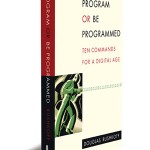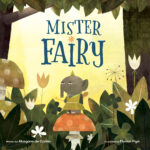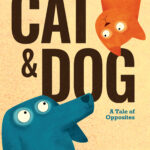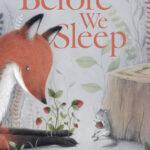Publishing Talks: Interview with Angus Yuen-Killick of Red Comet Press
April 21, 2021 by David
Filed under Publishing History, PublishingTalks, The Future
 Publishing Talks began as a series of conversations with book industry professionals and others involved in media and technology, mostly about the future of publishing, books, and culture. I’ve spent time in conversation with people in and around the book industry talking about its evolution in the contexts of technology, culture, and economics.
Publishing Talks began as a series of conversations with book industry professionals and others involved in media and technology, mostly about the future of publishing, books, and culture. I’ve spent time in conversation with people in and around the book industry talking about its evolution in the contexts of technology, culture, and economics.
Later, this series broadened to include conversations that go beyond the future of publishing. In an effort to document the current and recent past of book publishing, I’ve talked with a variety of editors, publishers and others who have been innovators and leaders of all kinds, past and present.
These conversations have been inspirational to me on many levels. I have gotten to speak with visionaries and entrepreneurs, as well as editors and publishers who have influenced and changed contemporary literature and culture. I’ve also had the opportunity to speak with a number of friends and colleagues whose work has influenced my own.
One such person is Angus Yuen-Killick, whom I have known since the 1990s when he came to the US to set up an outpost for a small UK publisher I was working with at the time. I was immediately impressed with Angus’ energy, vision and intelligence and since then, he has gone on to have a great career in children’s book publishing, his true love in the book business.
After working for several larger children’s book publishers over many years, Angus has now founded his own publishing imprint, Red Comet Press, about which he says:
“This is the realization of a long-held dream. The past year has forced us to reevaluate our priorities and reflect on our future. Launching a new publishing company seemed at once a crazy proposition, but also the absolute right thing to do.
At Red Comet Press, we will focus on the craft of publishing and curating a list of hand-picked titles. We will shepherd them through the publishing process, from creator to reader, with care and attention to detail. When we acquired these first books, it was a sign. They are inventive, surprising, touching, and multi-layered—and they remind me, upon every reading, of the passion and creativity that drew me to this business in the first place.”
Angus was interviewed earlier this year in Publishers Weekly, where he said “When I first started in the business, I worked at a tiny poetry publishing company in the north of England. My dad was an editor there and I was exposed to every aspect of the publishing process. When I left Macmillan last year and was trying to figure out the next step in my career after 30 years in corporate publishing, I realized that my dream was returning to that model of shepherding a list of books from the beginning to the end. This felt like the right thing for me to do next.”
Angus has help from his husband, Michael Yuen-Killick, a talented graphic designer, who serves as creative director for Red Comet, and a raft of friends and associates drawn from his many years of publishing. During his more than thirty years in book publishing, Angus has worked in key roles at various houses, including Macmillan, Penguin, Disney, and DK. I doubt there is anyone in children’s book publishing he does not know; he is widely respected and admired by his colleagues, and by many authors and illustrators as well.
It is always stimulating and fun for me to speak with Angus, so having him as a guest here is a special pleasure. If you are interested in the particular challenges of children’s book publishing, you will learn a great deal from Angus even from this brief interview. His knowledge and experience is unmatched. His enthusiasm and intelligence are often inspirational. And the books he publishes at Red Comet are going to be fantastic too. I am really looking forward to seeing his first list of books later this year.
Podcast: Play in new window | Download
Publishing Talks: David Wilk interviews Cevin Bryerman
May 29, 2011 by David
Filed under Ebooks and Digital Publishing, Publishing History, PublishingTalks, Technology, The Future
 In this series of interviews, called Publishing Talks, I have been talking to book industry professionals and other smart people about the future of publishing, books, and culture. This is a period of disruption and change for all media businesses. We must wonder now, how will publishing evolve as our culture is affected by technology, climate change, population density, and the ebb and flow of civilization and economics?
In this series of interviews, called Publishing Talks, I have been talking to book industry professionals and other smart people about the future of publishing, books, and culture. This is a period of disruption and change for all media businesses. We must wonder now, how will publishing evolve as our culture is affected by technology, climate change, population density, and the ebb and flow of civilization and economics?
I hope these Publishing Talks conversations can help us understand the outlines of what is happening in the publishing industry, and how we might ourselves interact with and influence the future of publishing as it unfolds.
These interviews give people in and around the book business a chance to talk openly about ideas and concerns that are often only talked about “around the water cooler,” at industry conventions and events, and in emails between friends and they give people inside and outside the book industry a chance to hear first hand some of the most interesting and challenging thoughts, ideas and concepts being discussed by people in the book business.
Cevin Bryerman is Publisher and Vice President of Publishers Weekly, the well-known international trade magazine for book publishing. Recently Cevin spoke at Montreal’s Atwater Library and Computer Centre about the changes revolutionizing the publishing world. His message there was reported to be “fatalistic, prescriptive, dismaying, and upbeat,” which probably reflects the way a large number of publishing people feel these days.
“The digital age is definitely here,” he told an auditorium packed with book industry professionals, “and you have to embrace it.” Indeed, the revolution has not left PW untouched, and the challenge that magazine has faced in transforming itself from a traditional subscription based print trade magazine into something very different is a continuing process.
I’m hopeful that our wide ranging and hopefully provocative conversation will spur further discussions and perhaps even raise some controversy about the current condition and future prospects for all the elements of the publishing ecosystem. Publishers Weekly online here. Very interesting (though brief) history of PW in Wikipedia here.
Publishers Weekly online here. Very interesting (though brief) history of PW in Wikipedia here.
Podcast: Play in new window | Download
Publishing Talks: David Wilk interviews John Oakes
October 26, 2010 by David
Filed under Ebooks and Digital Publishing, PublishingTalks, The Future
 In this series of interviews, called Publishing Talks, I have been talking to book industry professionals and other smart people about the future of publishing, books, and culture. This is a period of disruption and change for all media businesses. We must wonder now, how will publishing evolve as our culture is affected by technology, climate change, population density, and the ebb and flow of civilization and economics?
In this series of interviews, called Publishing Talks, I have been talking to book industry professionals and other smart people about the future of publishing, books, and culture. This is a period of disruption and change for all media businesses. We must wonder now, how will publishing evolve as our culture is affected by technology, climate change, population density, and the ebb and flow of civilization and economics?
I hope these Publishing Talks conversations will help us understand the outlines of what is happening, and how we might ourselves interact with and influence the future of publishing as it unfolds.
These interviews give people in and around the book business a chance to talk openly about ideas and concerns that are often only talked about “around the water cooler,” at industry conventions and events, and in emails between friends and they give people inside and outside the book industry a chance to hear first hand some of the most interesting and challenging thoughts, ideas and concepts being discussed by people in the book business.
OR Books was founded in 2009 by two very experienced book publishing veterans, Colin Robinson and John Oakes, who realized that after many years, that the way books have been published and sold in the 20th century no longer applies in the 21st. John’s description of their new venture (as told to O’Reilly Radar for their “TOC Evolvers” series) goes like this:
OR Books is driven by two concepts. Well, three. One: the current system of distribution and production, returns and discounts, in publishing doesn’t work for stores, authors, or publishers. Two: we will publish politically progressive and culturally adventurous work. Three: the classic rules of publishing still hold true: you need good editing, design, and marketing.
To address the first concept, we decided to scratch the Byzantine rules that surround the distribution and production of books: we sell straight to consumers, do intensive marketing, and then license the book to “traditional publishers.” We generally do not sell to wholesalers or booksellers, be they independent, Amazon, or Barnes & Noble. We are “platform agnostic,” offering consumers their books as ebooks or in physical, printed form. They choose.
I originally wanted to interview both John and Colin together, but the timing did not work out. Colin was someplace exotic like London, so I talked to John in his tiny home office in Manhattan. We had a great talk, as there is alot to talk about. Alert to listeners, and while this is the longest Publishing Talks interview I have done, at about 45 minutes long, I think well worth the investment of time and you can always listen to it in more than one sitting.
OR Books was founded by John Oakes and Colin Robinson as a publishing company embracing e-books and other new technologies. They have already published some excellent (and timely) books, their first being Going Rouge (a great book to launch with), Eileen Myles’ riveting novel Inferno, and Doug Rushkoff’s new Program or be Programmed. Their work is political, cultural, and literary, and so far has been terrifically interesting work.
John Oakes co-founded the publishing company Four Walls Eight Windows. When his company was purchased by the Avalon Publishing Group, he became publisher of Thunder’s Mouth Press, co-publisher of Nation Books, and vice president of Avalon. Among the authors he has published are Andrei Codrescu, Sue Coe, R. Crumb, Cory Doctorow, Andrea Dworkin, Abbie Hoffman, Gordon Lish, Harvey Pekar, Rudy Rucker, John Waters and Edmund White. Oakes serves on the board of PEN America. He has written for the Associated Press, the International Herald Tribune, and the Review of Contemporary Fiction.
Colin Robinson was until recently a senior editor at Scribner. Previously he was managing director of Verso Books and publisher of The New Press. Among the authors he has published are Tariq Ali, Noam Chomsky, Alexander Cockburn, Mike Davis, Norman Finkelstein, Eduardo Galeano, Eric Hobsbawm, Lewis Lapham, Mike Marqusee, Rigoberta Menchú, Matt Taibbi and Jann Wenner. He has written for a broad range of publications including The New York Times, The Sunday Times (London) and The Guardian (London) and has appeared on a wide range of broadcast media including NPR (“On the Media”), CNN, MSNBC, CBC and CSPN.
Podcast: Play in new window | Download
Publishing Talks: David Wilk interviews Eoin Purcell
May 21, 2010 by David
Filed under Ebooks and Digital Publishing, PublishingTalks, Technology, The Future
 In this series of interviews, called Publishing Talks, I have been talking to book industry professionals about the future of publishing, books, and culture. This is a period of disruption and change for all media businesses. How will publishing evolve as our culture is affected by technology, climate change, population density, and the ebb and flow of civilization and its economics? Publishing Talks interviews help us understand the outlines of what is happening, and how we might ourselves interact with and influence the future of publishing as it unfolds.
In this series of interviews, called Publishing Talks, I have been talking to book industry professionals about the future of publishing, books, and culture. This is a period of disruption and change for all media businesses. How will publishing evolve as our culture is affected by technology, climate change, population density, and the ebb and flow of civilization and its economics? Publishing Talks interviews help us understand the outlines of what is happening, and how we might ourselves interact with and influence the future of publishing as it unfolds.
These interviews give people in the book business a chance to talk openly about ideas and concerns that are often only talked about “around the water cooler,” at industry conventions and events, and in emails between friends. I believe these interviews give people inside and outside the book industry a chance to hear first hand some of the most interesting and challenging thoughts, ideas and concepts being discussed within the industry.
Eoin Purcell works and lives in Dublin, Ireland. He is a publishing industry analyst and commentator. He runs Green Lamp Media, a publishing and publishing services company and also edits Irish Publishing News.
He has worked as Commissioning Editor with one of Ireland’s oldest independent publishers Mercier Press and at Nonsuch Ireland (now The History Press Ireland). He writes occasional blog posts and columns on the Irish book trade for The Bookseller magazine.
I was prompted to talk to Eoin by his persuasive and cogent article that appeared in (Ed Nawotka’s highly recommended online newsletter) Publishing Perspectives called “E-Books are a Cul-de-sac: Why Publishing Needs to Rethink its Digital Strategy.” In my view, Eoin consistently thinks and writes clearly about the unfolding future of a digital publishing future. In this conversation we talked mainly about how publishers (and authors) can and must adapt to the emerging environment created by new technology (and new distribution models), including practical ideas and actions they can take to embrace new tools and methods of reaching readers in a profitable way. He expressed his view that publishers need to focus on longer term trends, the values they can provide to readers (and writers) and then build their businesses around identifiable communities of readers. We also talked about the differences in marketing paradigms that digital publishing establishes for publishers, the idea of “publishing as community” and much more.
Eoin provides a fresh, incisive perspective along with realistic ideas and strategies for publishers who want to embrace a new paradigm of publishing based on a web-centric environment. I think this conversation will be valuable to anyone (publisher or author) who is interested in creating a successful digital strategy for the long term future.
Podcast: Play in new window | Download



